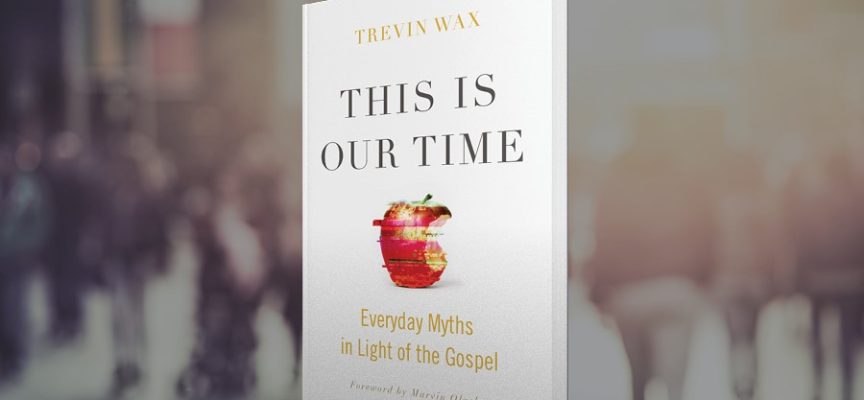On March 1, 2017, Broadman & Holman publishers will release a book entitled, This is Our Time: Everyday Myths in Light of the Gospel, by Trevin Wax. Along with books such as Rod Dreher’s The Benedict Option, Anthony Esolen’s Out of the Ashes, and Jamie Smith’s Awaiting the King, the release of This is Our Time will be one of the most significant publishing events of the year.
In This is Our Time, Trevin shines a spotlight on three things American Christians absolutely must do if we want to bring our nation into a meaningful encounter with the gospel: we must (1) gain a mastery of the Bible and its overarching narrative, (2) pay careful attention to our social and cultural context in order to identify the gods and myths that hold Americans captive, and (3) draw upon the biblical narrative in order to show the gospel’s superiority over these counterfeit gods and false systems of salvation.
Because I’ve read the book in its rough draft version and recognize its significance for this moment in American history, I invited Trevin to answer a few questions about the book and his motivations for writing it. Here are my questions and his answers:
Bruce Ashford: Who is Trevin Wax?
Trevin Wax: I’m tempted to answer this question by listing off accomplishments and responsibilities, or the roles I play in various spheres of life. But Google could answer those for you. The more fundamental answer is to say — Trevin Wax is a person made in the image of God, who by grace is being remade into the image of God’s Son, and who is empowered by God’s Spirit to serve God’s people. That’s the fundamental answer — which, I realize, is another way of saying, “Trevin is a Christian.” Still, you can’t get any more foundational to my identity than that. And beyond that answer, anything else I might say is just icing on top of the cake.
Bruce Ashford: OK, let’s talk about the icing on the cake. Tell me a little bit about your journey since coming to know the Lord?
Trevin Wax: I trusted Christ as a young child and then grew into the Faith through exposure to God’s Word and through God’s people. As a teenager, I took multiple mission trips to Romania, still in the first decade of coming out of Communism. When I was nineteen, I bought a one-way ticket and moved there for five years. In that time, I learned the language, did mission work, began to write, got married, and we had our first son. Back in the States, I extended my writing to blogging (in 2006), and over time, that led to several books while I was an associate pastor and working on my seminary degree and launching a curriculum called The Gospel Project. I completed my PhD at Southeastern Baptist Theological Seminary (SEBTS) in 2015, and I am currently serving as the Bible and Reference Publisher at LifeWay.
Bruce Ashford: As a teenager, you were a missionary in Romania. But it seems to me that you never left the “missionary posture” behind when you came back to the States. Am I right to describe your new book as a missionary-like attempt to bring the United States into a meaningful encounter with the gospel?
Trevin Wax: Absolutely. I cannot overestimate the impact that being involved in cross-cultural mission work had on me. It gave me the opportunity to see my own country with different eyes, to see through some of the powerful myths and stories in our society that we live by, often without even thinking about them. If we are to be “on mission” for Christ and His kingdom no matter where He has placed us, we must understand our times, our society, our culture so that we can present the gospel as the answer to the world’s deepest longings and the challenge to the world’s most pervasive lies.
Bruce Ashford: You mention “powerful myths and stories” that hold Western society captive. Will you select a few of those myths and stories, and provide a brief description of them?
Trevin Wax: You can see various myths and stories in the entertainment that is popular in society — in music, books, movies, TV shows. There are themes like “The American Dream” — that with willpower and a little bit of luck, a lone individual can achieve their dreams. There are themes like “the Myth of Decline” — that the world is getting worse and worse, that we have fallen from a pinnacle of success in the past and must ‘get back’ to that older world. There are themes that line up with consumerism: the idea that success is measured in how financially stable you are and how many possessions you can consume or accumulate. There is the Myth of Progress that animates many of our elite institutions and universities: the idea that humanity is on an upward path toward rational, enlightened thinking that sheds religious superstitions and outdated morality in the past, as we surge forward to a secular future.
Bruce Ashford: If these myths and stories hold our society captive, how does the gospel liberate us from that captivity?
Trevin Wax: We don’t believe in the gospel simply because it’s helpful, or makes us feel good, or satisfies our needs (although — when rightly understood, the gospel may accomplish all of those things). We believe in the gospel because it’s true. We believe that the Bible tells the true story of the world. This isn’t a pleasant fiction we’ve created to bring meaning to our individual lives. It’s the stunning truth that brings significance to the entire world. The gospel reorients our understanding of time — past, present, and future — around God’s activity and His promises. Liberation comes when we see how the gospel exposes the lies in the great myths of our society, but in a way that fulfills the deeper longings that give rise to those myths. The gospel both affirms the deeper longings and challenges the untruths in the myths that prevail in our culture.
Bruce Ashford: Why do you believe Christians need the truths you present in this book?
Trevin Wax: Because we are to be on mission in whatever context God has placed us. The where of mission is also impacted by the when of mission. We ask the question, “What time is it?” What are the beliefs, practices, and trends we see on display in our society in this particular moment? How do we best present the gospel in this kind of world? When we ask these questions, and when we start examining beliefs and practices of the world, we begin to realize just how formed we are by our context. We discover areas in our own lives where we have fallen short of the biblical standard or where we have made assumptions that are more worldly than biblical. Exposing these areas should lead to repentance and refreshment and rejuvenation for living as Christ’s ambassadors in the 21st century.
Subscribe
Never miss a post! Have all new posts delivered straight to your inbox.







